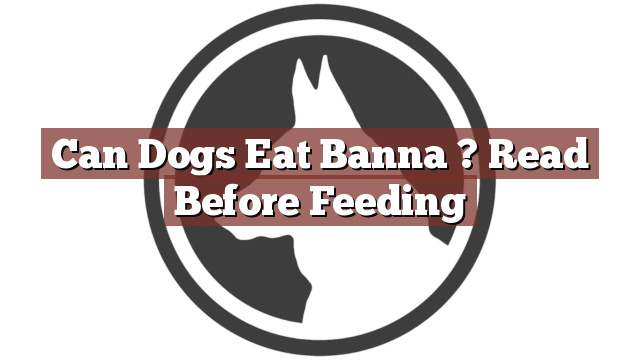Understanding Your Dog’s Dietary Needs
As responsible pet owners, it is crucial to understand our dogs’ dietary needs to ensure their overall health and well-being. Dogs are primarily carnivorous animals, and their main source of nutrition should come from animal protein. However, they can also benefit from some fruits and vegetables in moderation. Before incorporating human food into their diet, it is essential to know which foods are safe for dogs and which ones to avoid.
Can Dogs Eat Bananas? Read Before Feeding
Can dogs eat bananas? The answer is yes. Bananas are not toxic to dogs and can be a healthy addition to their diet when given in moderation. Bananas are low in calories, high in fiber, and rich in essential vitamins and minerals like potassium and vitamin C. However, it is important to remember that bananas should be considered a treat and not a staple food for dogs.
Pros and Cons of Feeding Bananas to Dogs
Feeding bananas to your dog can provide various benefits. The fruit is an excellent source of potassium, which helps maintain proper muscle and nerve function. Additionally, bananas contain vitamin C, which boosts the immune system and promotes healthy skin and coat. The high fiber content in bananas can also aid in digestion and relieve constipation in dogs.
While bananas have their advantages, there are a few things to consider before feeding them to your furry friend. Bananas are relatively high in sugar, which can lead to weight gain and other health issues if consumed excessively. Therefore, it is crucial to offer bananas as an occasional treat and not as a replacement for a balanced diet. Furthermore, some dogs may have difficulty digesting bananas, leading to gastrointestinal upset. Always introduce new foods gradually and monitor your dog for any adverse reactions.
Conclusion: Considerations for Feeding Bananas to Your Dog
In conclusion, bananas can be a safe and nutritious treat for your dog when given in moderation. The high fiber, potassium, and vitamins present in bananas can provide various health benefits for your furry companion. However, it is important to remember that every dog is different, and what works for one may not work for another. Before introducing bananas or any new food into your dog’s diet, it is best to consult with your veterinarian to ensure it aligns with their specific dietary needs and any pre-existing health conditions. As with any treat, moderation is key to prevent any potential negative effects on your dog’s health.
Thank you for taking the time to read through our exploration of [page_title]. As every dog lover knows, our furry friends have unique dietary needs and responses, often varying from one canine to another. This is why it's paramount to approach any changes in their diet with caution and knowledge.
Before introducing any new treats or making alterations to your dog's diet based on our insights, it's crucial to consult with a veterinarian about [page_title]. Their expertise ensures that the choices you make are well-suited to your particular pet's health and well-being.
Even seemingly harmless foods can sometimes lead to allergic reactions or digestive issues, which is why monitoring your dog after introducing any new food item is essential.
The content provided here on [page_title] is crafted with care, thorough research, and a genuine love for dogs. Nevertheless, it serves as a general guideline and should not be considered a substitute for professional veterinary advice.
Always prioritize the expert insights of your veterinarian, and remember that the health and happiness of your furry companion come first.
May your journey with your pet continue to be filled with joy, love, and safe culinary adventures. Happy reading, and even happier snacking for your canine friend!

